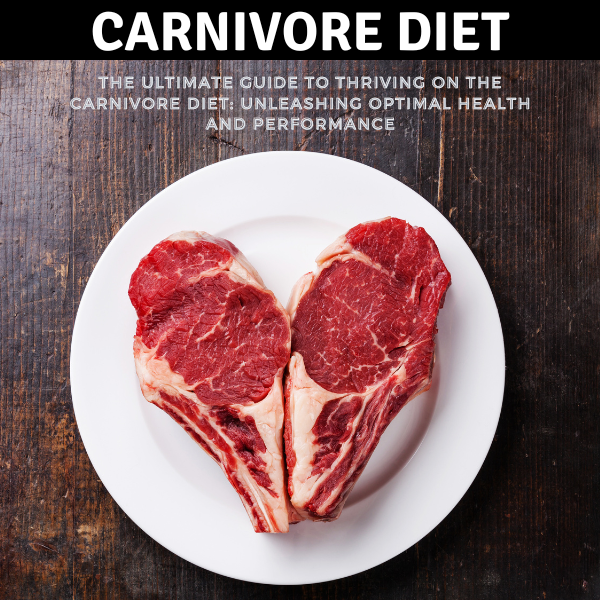New Lessons added weekly.
Course Duration: 10 Modules (take them at your own pace)
Course Objectives:
By the end of this course, students will be able to:
1. Understand the principles and key concepts of the carnivore diet.
2. Identify the potential benefits and risks associated with following a carnivore diet.
3. Analyze scientific research and studies related to the carnivore diet.
4. Create personalized meal plans that align with the carnivore diet.
5. Critically evaluate current debates and controversies surrounding the carnivore diet.
6. Promote healthy lifestyle habits while incorporating the carnivore diet.
7. Apply alternative strategies for individuals with specific dietary needs or restrictions.
8. Develop effective communication skills to educate and support individuals interested in the carnivore diet.
9. Understand the ethical considerations of consuming an animal-based diet.
Course Outline:
Module 1: Introduction to the Carnivore Diet
- Overview of the carnivore diet principles
- Historical context and evolution of the diet
- Nutritional considerations and macronutrient ratios
Module 2: Benefits of the Carnivore Diet
- Weight loss and body composition management
- Mental health and cognitive improvements
- Blood sugar regulation and metabolic health
Module 3: Potential Risks and Controversies
- Nutrient deficiencies and supplementation
- Gut microbiome impact
- Long-term sustainability and potential risks
Module 4: Scientific Research on the Carnivore Diet
- Analysis of key studies and findings
- Understanding limitations and biases in research
- Evaluating scientific literature related to the carnivore diet
Module 5: Meal Planning on the Carnivore Diet
- Creating balanced meal plans and optimizing nutrient intake
- Adapting to dietary restrictions and preferences
- Meal preparation techniques and recipes
Module 6: Supporting Individual Needs
- Carnivore diet for athletes and active individuals
- Addressing hormone imbalances and women's health
- Modifications for individuals with existing health conditions
Module 7: Ethical Considerations
- Environmental impact and sustainability of animal-based diets
- Ethical debates and alternative approaches
- Balancing personal choices and ethical dilemmas
Module 8: Debunking Common Myths and Misconceptions
- Addressing popular misconceptions about the carnivore diet
- Safety concerns and evidence-based responses
- Public perception and media influence
Module 9: Communicating the Carnivore Diet Effectively
- Developing effective communication skills
- Providing evidence-based information and support
- Addressing skepticism and engaging in respectful discourse
Module 10: Final Project and Wrap-Up
- Applying the knowledge and skills gained throughout the course
- Presenting a comprehensive plan or case study related to the carnivore diet
- Course reflection and final Q&A session
Note: This course outline is a general guideline. The actual content and structure may vary based on the institution or instructor preferences.
What will i learn?
- Understand the principles and foundations of the carnivore diet, including its historical context and scientific basis.
- Develop a comprehensive knowledge of the different types of foods that are allowed on the carnivore diet, as well as those that should be avoided.
- Learn how to properly plan and prepare meals that adhere to the carnivore diet, ensuring optimal nutrient intake and overall health.
- Gain an understanding of the potential health benefits associated with the carnivore diet, such as weight loss, improved digestion, and increased energy levels.
- Learn about potential challenges and side effects of the carnivore diet, and how to overcome them for long-term success.
- Explore the role of the carnivore diet in enhancing athletic performance, including strength, endurance, and recovery.
- Understand the scientific evidence supporting the carnivore diet, and critically evaluate conflicting research and opinions.
- Learn how to modify the carnivore diet to meet individual dietary needs, preferences, and health conditions.
- Develop strategies for effective transition and sustainability on the carnivore diet, including tips for dining out and traveling.
- Gain knowledge of additional resources and support networks to continue thriving on the carnivore diet and maintain optimal health and performance.
- Open Mindset: Approach the course with an open mind and willingness to explore alternative dietary approaches.
- Access to Course Materials: Ensure access to the course materials, including lectures and discussions
- Time Commitment: Dedicate sufficient time to engage with the course content and participate in discussions and activities.
- Note-taking Tools: Have note-taking tools available to capture key concepts, insights, and action steps.
- Meal Preparation: Be prepared to implement practical tips and strategies discussed in the course, including meal planning and preparation.
- Commitment to Health: Maintain a commitment to your health and well-being throughout the course, seeking to optimize your experience on the carnivore diet.
-
Overview of the carnivore diet principles
00:01:37
-
Nutritional considerations and macronutrient ratios
00:02:19
-
Historical context and evolution of the diet
00:02:00
-
Weight loss and body composition management
00:01:41
-
Mental health and cognitive improvements
00:01:04
-
Blood sugar regulation and metabolic health
00:01:07

Write a public review